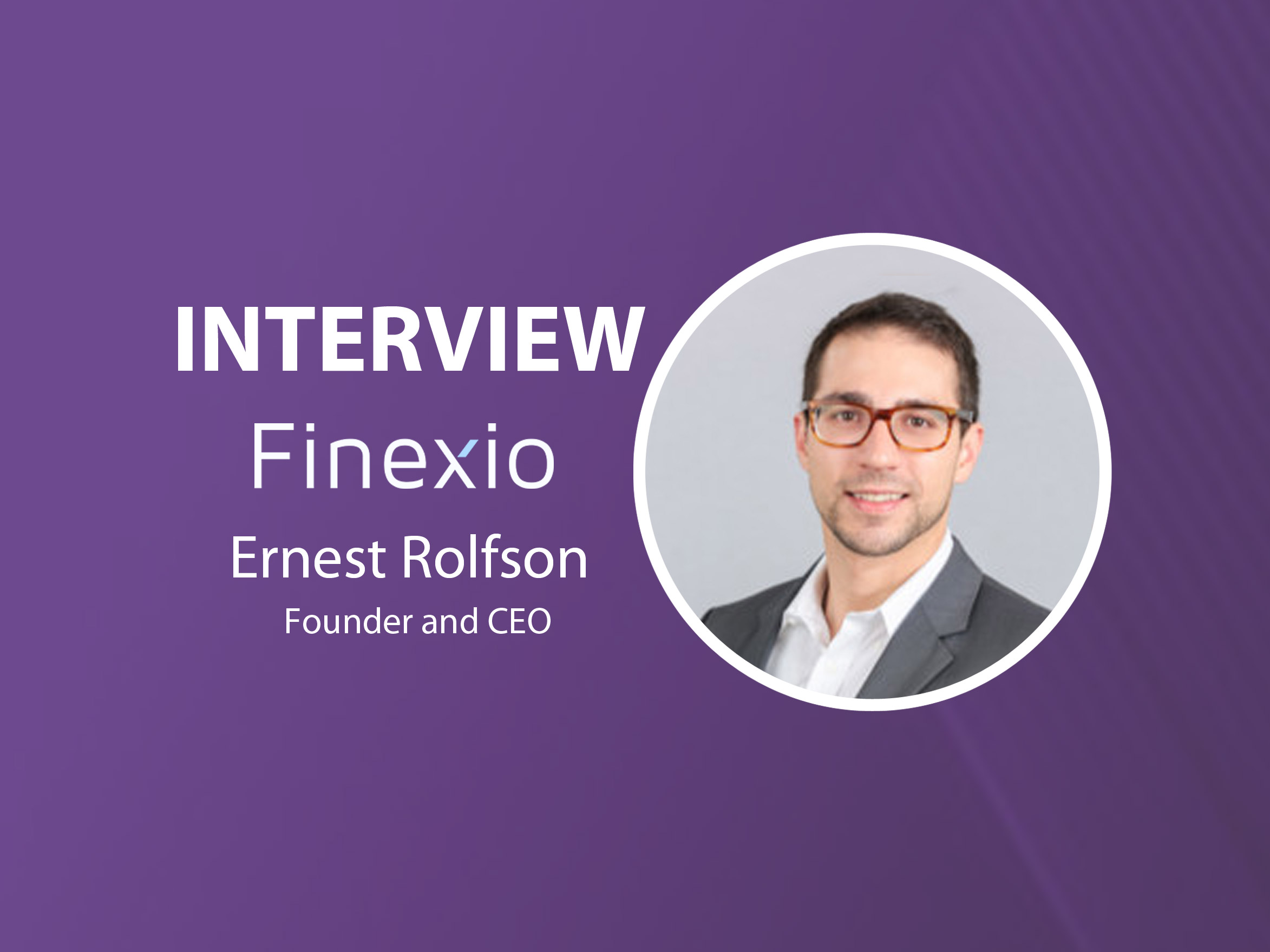There have been a slew of new “integration as a service” solutions with major tech players like Salesforce and many others making their platforms integrate into financial services or “sources of truth”. Ernest Rolfson, Founder and CEO at Finexio shares his thoughts on what businesses should look for when streamlining cross border payments with new fintech apps while also weighing in on the transforming fintech landscape.
_____
Can you tell us a little about yourself Ernest? How did the idea behind Finexio first come about and since its inception – what have been some of your biggest highlights/challenges?
I enjoy working on really complex problems that have the potential to improve the lives of millions, which is what I’ve worked on for the bulk of my career. The idea behind building my company came from my experience being involved in the early days of business to business credit card payments and observing how inefficient manual (and other B2B payments) were handled. I mentally envisioned a better way of delivering a more efficient product experience that would be good and approved by buyers and suppliers. The biggest highlight was building a B2B payment network with more than $1B dollars of invoice value connected into it. The challenges have been numerous, but the hardest parts have been raising capital from investors who typically do not understand this niche vertical as well as recruiting capable, trustworthy talent.
Read More: GlobalFintechSeries Interview with Erick Pinos, Ecosystem Lead at Ontology
How do you see emerging tech play a key role in how newer fintech innovations are built/developed, especially account payable and payment apps?
Most industry incumbents are running on old IBM AS/400 mainframes that are expensive to maintain and keep up with. Large financial institutions are also using hard to manipulate legacy systems. Maintaining a low-cost infrastructure and speed to develop is a key advantage in modern fintech development. I’m also observing many low code or no code platforms to be able to get protypes and demos live and in customers or prospects hands very quickly, effectively eliminating the need for expensive developers to help get product out the door. Additionally, there have been a slew of new “integration as a service” solutions and major players (like Salesforce) and others are making their platforms integrate into financial services or “sources of truth”. These services make it easy to pull from and work with complex financial data within large enterprise infrastructure suites most companies nowadays run on.
When it comes to streamlining and optimizing the payments delivery and the accounts receivables process: what are some of the top features that business users should look for when they identify/shortlist fintech platforms?
The biggest thing I would look at is if this is a product that I need to manage myself or a product that delivers as a service for me. Buying an app that now becomes a “tool” that I will have to train people to use isn’t necessarily better than the “old way.” If I could buy an app that magically makes my problem go away, there could be real value there. For instance, if you did an online search for B2B payments or ACH payments, you could find hundreds of responses – with many companies selling commodity transactions that could effectively solve the problem. The issue is that the payment products themselves are in fact commodities and take client expertise and time to implement and take advantage of. A major player (like Stripe) can advertise “just use our simple API,” but the reality is, you would need developers and product people to figure out how to take advantage of their complex technology. I see a future where you can make a few clicks and the problem you want to solve is immediately solved – no extra buttons to press or proverbial knobs to dial.
How do you see the fintech segment shape up in the next couple of years, keeping in mind the current world situation (and need to be remote while digitizing everything): what are the top features that fintech platforms will have to adopt more towards?
Online has been the path forward for many years now, but the current situation is only accelerating that model. Features like being able to access and modify the app via a simple web browser for payments is the most critical, and surprisingly, still not completely common place in B2B payments.
Given the current world situation, what would your top tips be to B2B/Global tech (product) companies to secure their transactions and prevent fraud when using cloud-based payment and receivables apps?
The first would be to ensure all staff is regularly trained via third party security firms in a mandated, auditable process. Secondly, leverage a third party anti-fraud monitoring solution and account/company validation tools to check validity of transactors. Third would be to follow strict policies and procedures put in place by their Chief Information Security Officer. Finally, using third party encryption services that keep transactional data and customer account data separate from other critical systems would be mandatory.
Read More: Coronavirus Highlights the Virtues of Crypto Alternatives
What are some of your thoughts on how the current world situation will impact the use of fintech, for individual users and business users?
We are already seeing an acceleration of usage from business users- from where I sit that is going to be the biggest change going forward. The consumerization of finance is starting to happen and COVID-19 is forcing it forward. It’s impossible to send paper checks from the office when your staff is not allowed in the office. It’s impossible to make accounts payable payments when your accounts payable staff has been furloughed. It’s impossible to approve a payment to be paid when all of your invoices are being mailed to an office location via paper. These few examples are just some of the trends that are forcing CFOs of commercial enterprises to look at ways to do things digitally, via the internet, with a remote first mindset. It will be very tough to go back to the “old way” once a new product or process is selected. Surprisingly, most of the modern conveniences (mobile, online, UI, simplicity, etc.) that we have been used to as consumers, do not exist in the commercial world for B2B payments.
How do you think the payment-as-a-service niche will evolve with time to meet the needs of both B2B users and individual business owners?
The evolution that we are driving is the convergence of payments and working capital management. Providing buyers and suppliers with more clear, flexible and easy to engage options on how, when, how much to be paid, and at what cost is the new convergence that will occur. The finance and payments world are still very much separated and bank “Chinese Walls” are preventing bank innovation to drive this – leaving fintech players to benefit.
Tag (mention/write about) the one person in the fintech industry whose answers to these questions you would love to read!
I’m a big fan of Stuart Harvey, the executive chairman of Paysafe group. He has been a kind mentor and supporter throughout my payments career.
Your favorite FinanceTech quote
One of my favorites is “The future is already here, just not evenly distributed,” by William Gibson. I think that has a lot to do with technology, including fintech.
Would you like to share specific finance or business tips for Marketing and Sales teams struggling through this uncertain time?
If you haven’t developed specific COVID-19 talking points or shifted to communicate on how your product or service can help businesses navigate these challenging times, now is the time to do it. Content specifically geared at high touch service or differentiation seems to be resonating as well.
Read More: Are Google, Amazon, Apple the Next Big Thing for FinTech?
Finexio simplifies Accounts Payable (AP) payments by eliminating all friction in payment delivery and supplier payment acceptance. Finexio’s comprehensive accounts payable “payments-as-a-service” solution leverages proprietary analytics and robotic process automation to drive maximum conversion rates of suppliers to electronic payments. Finexio’s intelligent business-to-business payment network identifies, delivers and supports a variety of outbound payment methods, generating revenue and cost savings for accounts payable departments while offering complete transparency and control of the payment process.
Ernest Rolfson is the CEO and Founder of Finexio, a Payments-as-a-Service company that simplifies Accounts Payable (AP) payments for middle and large market companies. He has more than 12 years’ experience leading businesses in B2B payments, accounts payable, and payments processing. Prior to starting Finexio in 2015, Ernest led M&A and partnership at a Blackstone portfolio company, managed a $40M business at MasterCard, and advised public and private CFO’s on working capital management at EY.

